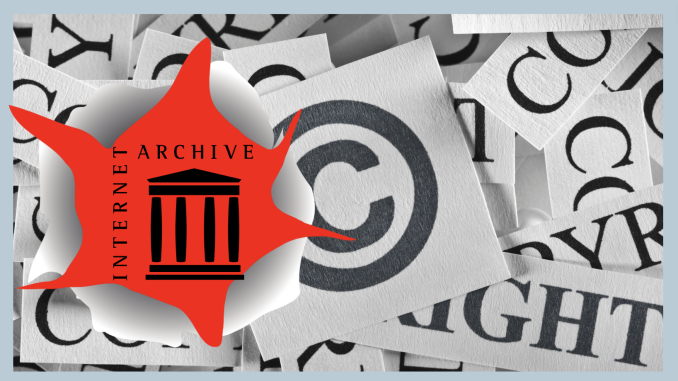
By Shea Stevenson
The Internet Archive is an online non-profit library that houses all kinds of media, from 1920s pulp magazines to defunct 90s websites. Its older-internet surfing function, perhaps its most well known function, is called the Wayback Machine. Most recently, the Internet Archive lost a lawsuit against four major publishers: Hachette, HarperCollins, Wiley, and Penguin Random House who claim that the Internet Archive has lost them millions in revenue.
Not only is that thoroughly unconvincing on the face of it, (millions?) but also, that’s what a library does. It’s an online library.
If the Internet Archive goes down, which it seems like at least some swath of it will, then we’ve lost a load-bearing column of our modern history. There are innumerable webpages, books, videos, all kinds of things that never got a physical copy, that would be lost if even just the Wayback Machine went down. Anyone who’s ever tried to find something old or obscure on the internet has eventually come to the Internet Archive, and often, it’s the final stop on those searches. So if it’s definitely not losing these companies millions, why would they want to nuke it?
Companies try their best to stop you from owning anything at all. Back in the day, this was the mining town, where you worked for the company that owned the mine, your house, the places you ate at, and everything else. Nowadays, the most common version is that everything is online and you’re only renting it. That’s why subscription services are useful to them; you no longer own your stuff, you don’t have agency over it, you can only interact with it in ways that the company allows you to. If they don’t want you to have it anymore, they can take it away. In that way, this is an obvious choice by the publishers. It’s not about profit loss, but rather consolidating control over their copyrighted works. If you can’t get it through the library, you have to get it through them, and that gives them all the power to draw up the terms of engagement.
If it were legal, companies would be doing this to all libraries everywhere. It’s only working here because the government doesn’t seem to know what the internet is, nor how to handle it in terms of legality. Lots of people are unsure if the internet is even real life.
In a system with both copyright and major corporations, situations like this are always crawling from the woodwork. It doesn’t matter what the common good is, it doesn’t matter if everyone on Earth were to agree that the archive is incredibly useful, it doesn’t matter that the defining forum for our era’s lived reality – the internet – is inevitably going to be lost to time because we have chosen shareholders as its caretakers. They have the money, they have the paper that says the idea is theirs, and they don’t want to spend money keeping it archived, it’s gone. And should anyone try to save it, they’ve become a criminal.
On a smaller scale, we see stuff like this often these days. There was a stink raised about HBO Max removing some cartoons (like “OK.KO.” and “Infinity Train”) a couple months ago, because it turns out that HBO was the only one who had the license to stream those shows and they were electing not to. The shows still have limited legal ways to view them, but the message comes across. Art on these platforms is disposable if any degree of profit is in the balance. Everything made in the age of streaming, everything that never had a DVD, Blu-Ray, CD, vinyl release, is always on the edge of being lost. As soon as it’s not profitable to keep a server running with that data on it, it’s gone.
Our only hope is piracy then, obviously. As long as one person has it on a flash drive, we can all have it (illegally). It’s like the Irish hermit-monks copying the ancient texts during the European dark ages and hiding the books. To future historians, or simply future scavengers who hope to understand what on Earth was happening to us, these pirating sites are the actual Rosetta Stones and secret treasuries of our times. Somewhere, someone has a room full of terabyte hard drives and CDs and DVDs filled with all the inane nonsense no one ever thought to keep, and that person is the most important recordkeeper of the modern age.
